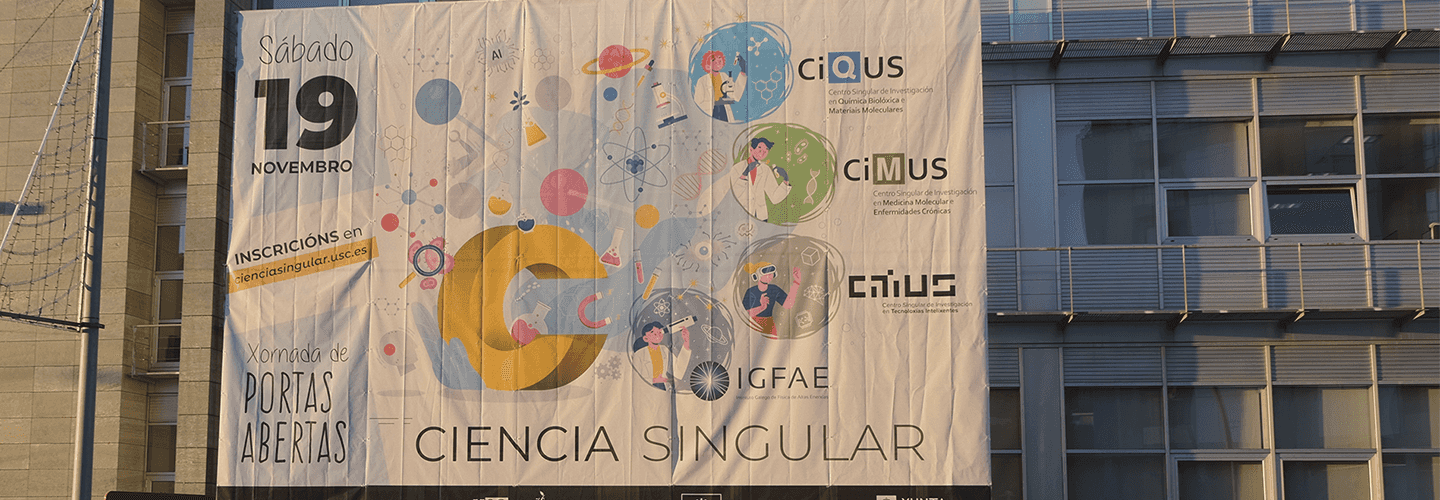
CiTIUS celebrates this Saturday the 6th edition of 'Singular Science' Open Day
CiQUS, CiMUS, CiTIUS and IGFAE open their facilities to bring society closer to the cutting-edge research being carried out at the USC's Network of Singular Research Centres.
CiTIUS will participate once again in Singular Science, one of the most awaited events of the year by the people of Santiago de Compostela. The Red de Centros Singulares de Investigación of the Universidade de Santiago de Compostela (USC) will open its doors again next Saturday 19 November in a very special day that will bring the public closer to the cutting-edge research carried out in the centres of the network, as well as the challenges achieved and those yet to be achieved. Science is everyone's business, and Singular Science is a great opportunity to vindicate it in a big way. A celebration that for the sixth consecutive year involves society to publicise the latest advances in chemistry, physics, molecular medicine or intelligent technologies, and where a space for collective reflection on science is generated which, above all, also allows for a fun day out with the family.
The Centro Singular de Investigación en Tecnoloxías Intelixentes (CiTIUS) maintains its commitment to align the demonstrators of the day with the Sustainable Development Goals (SDGs), and will host throughout the day different conferences and guided tours with topics as varied as the use of Big Data technologies for the detection of medical misinformation, or the interactive exploration of large volumes of environmental observation data. The visit will allow the youngest visitors to get closer to intelligent technologies, giving them the opportunity to live experiences such as driving a robotic arm, playing a game of scalextric with cars equipped with artificial intelligence that learn autonomously, or discovering how small humanoids work. Meanwhile, adults will also be able to experience in a Virtual Reality setting what it is like to re-imagine themselves, others and the microscopic world around us.
The activities of this event, funded by the Consellería de Cultura, Educación, Formación Profesional y Universidades , will take place throughout the day on Saturday. To take part in them it will be essential to register in advance on the event website.
At CiQUS
Visitors to the Centro de Investigación en Química Biolóxica e Materiais Moleculares (CiQUS) will become "molecular detectives" for a day, so they will have to be very attentive to be able to identify molecules. Visitors will also be able to infiltrate the laboratories, find out in situ how the centre's scientists work and talk first-hand with them about interesting challenges such as graphene materials or the use of nano-tools with biological applications. The little ones will have fun playing with polymers, observing how some bacteria glow using a fluorescent protein, or learning the secrets of molecular cuisine, among other surprises that have been prepared for the day.
Visiting CiMUS
To celebrate the "Santiago Ramón y Cajal Research Year", the Centre for Research in Molecular Medicine and Chronic Illnesses (CiMUS) will be organising a series of workshops dedicated to neuroscience, among others. Visitors will also have access to the laboratory dedicated to early drug discovery, and its programme of informative talks will cover such interesting topics as autism, cardiovascular diseases, epitranscriptomics and the rate at which we age. The little ones will become real scientists by observing samples of animal and plant cells under the microscope, they will learn about proper oral health while making a natural toothpaste, or the importance of hygiene while making a personalised soap.
Approaching the IGFAE
The informative talks of the Instituto Galego de Física de Altas Enerxías (IGFAE) will bring us closer to the most extreme events of the universe, gravitational waves and black holes, but also to the medical applications of physics and to the heart of matter. The workshops will allow us to learn about and detect in real time the radiation that reaches us from space, and to enter a laser acceleration laboratory, while the little ones will be able to enjoy a fun show of experiments using the scientific method. The IGFAE programme is rounded off by a series of self-guided exhibitions, one of them to mark the tenth anniversary of the discovery of the Higgs boson and the other with a chart of nuclei built with Legos to visualise isotopes in three dimensions.
The organising centres are accredited and funded by the Regional Ministry of Culture, Education, Vocational Training and Universities through the Programa de audas para la acreditación, estruturación y mejora de centros de investigación del Sistema Universitario de Galicia (SUG), co-financed through FEDER (programa operativo Feder Galicia 2014-2020).
Further information and detailed programme on the event's website: https://cienciasingular.usc.es/